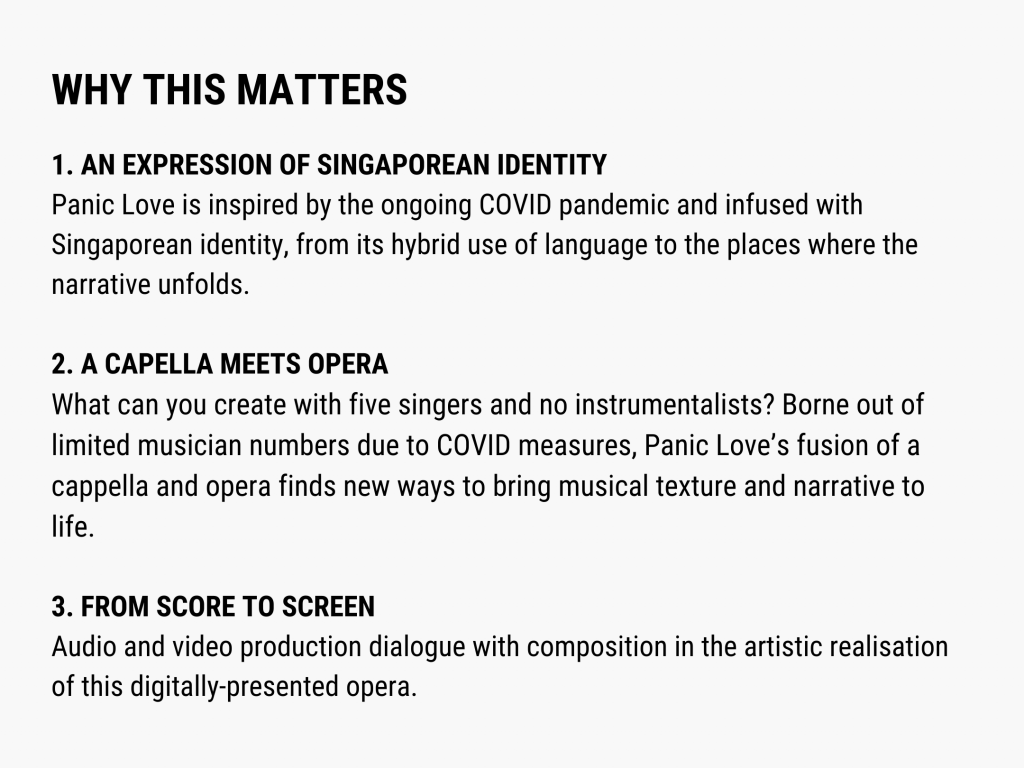
I teach theory and composition at YST (with interest in topics like counterpoint, music and poetry, choral music). As a musician, I primarily am a composer and also perform on the viola (sometimes violin), playing with the Red Dot Baroque. I used to conduct new works with YST’s new music ensemble, OpusNovus, but now mainly conduct my own works. In my research and creative output, I often work on genres like song and opera, but also write for a range of instruments and ensembles including orchestra.
During the circuit breaker (Singapore’s period of enhanced social distancing and isolation in 2020 to contain the COVID pandemic), the writer Felix Cheong was inspired by our safe distancing enforcement officers and the safety rules they enforce (which he translated into the main character). He sent me an initial script around April which I felt could be the basis for an opera libretto, and with which we successfully applied for the National Arts Council Digital Presentation Grant. I had around three months from August to finish composing the music, and we then had to record and film everything by the end of the year!
There were other collaborators such as dramaturg and theatre director Nora Samosir, as well as alumni-formed company Poco Productions and video company The Floating Folks. I also got to step out of the shoes of just being the composer into organising the project, such as speaking to business owners for venue sponsorships so we could film at shops, restaurants and public spaces. The many moving parts of this collaborative effort made it really interesting and fun.
It is a play on the phrase ‘panic buy’, which was a real phenomenon during the circuit breaker when everyone was rushing to hoard necessities like toilet paper and flour! We felt it was a nice twist evoking the idea of loving at the last minute, which is particularly pertinent for the main character Mariam and her aging mother as they negotiate differences in perspective amidst the COVID pandemic.
Due to COVID guidelines, we had to restrict the number of musicians involved and ultimately decided to keep to five singers (two main characters and three Greek chorus members) without instrumentalists. It became a meeting of a cappella (typically a pop genre today) and opera – a rather interesting fusion that is not quite so common in recent repertoire, but has references in older works such as unaccompanied vocal church music by Monteverdi. The Greek chorus played a richer role than usual by forming the underlying texture and rhythm as well as playing with the text. For example, with a line such as “no, auntie, no”, I could play with repetitions of “no” to create an insistent rhythm. Another such line was “no, uncle”, which I altered to “nuh-uh, uncle”, giving a more colloquial, less serious feel.
In my previous set of three chamber operas, the Singapore Trilogy, the exploration and representation Singaporeanness was at the forefront, be it in terms of linguistics (Singlish and the dynamic flow of the different Singlishes) or the local context.
In Panic Love, these elements are present as well – obviously, social distancing during the circuit breaker is very local and current (as well as necessary during a pandemic!). I played with some linguistic aspects as well – for example, an English line such as “stay home and watch TV/listen to the radio”, I translated into Hokkien, referencing the calls of local karang gunis (rag-and-bone men). I also wove Malay and Chinese dialect phrases into the mainly-English libretto, such as “makan” (Malay: “to eat”) and “lim teh” (Chinese dialect: “drink tea”). This hybrid mixture of different cultural elements makes the opera cosmopolitan and that rojak-ness is to me a key characteristic of Singaporeanness. (rojak: Malay; a local salad with a mix of sweet and savoury ingredients; also an adjective describing a mixture).
The phone call scene was perhaps the most fun to write, rehearse and record. It involves the Greek chorus making fun of the tense phone call between the main character Mariam and her mother, such as by parroting dialogue and making sounds resembling phone static. They take apart words such as “busy” and “national duty” (Mariam’s justifications against the call and visiting her mother) into consonants and vowels, and even incorporate some vocal warm-ups such as trills and slides. In terms of expression, it was a total juxtaposition against what the phone call was supposed to be.
The subject matter – the circumstances of 2020 – is unique and certainly never done before. More importantly, it was about working with the full team across the librettist, dramaturg, director, production company and the five singers. The creation process was multi-layered, with feedback from the musicians as well as compositional and dramatic tweaks along the way. One interesting thing about this fusion of genres was that the audio engineers had to navigate the recording microphone setup as opera and a cappella tend to have further and closer mic-ing respectively! The audio engineering and video filming were as important as the composition aspect because they could change the final output so vastly, each in themselves becoming elements to explore artistically.
View Stories by Themes
YST CONSERVATORY
National University of Singapore
3 Conservatory Drive
Singapore 117376